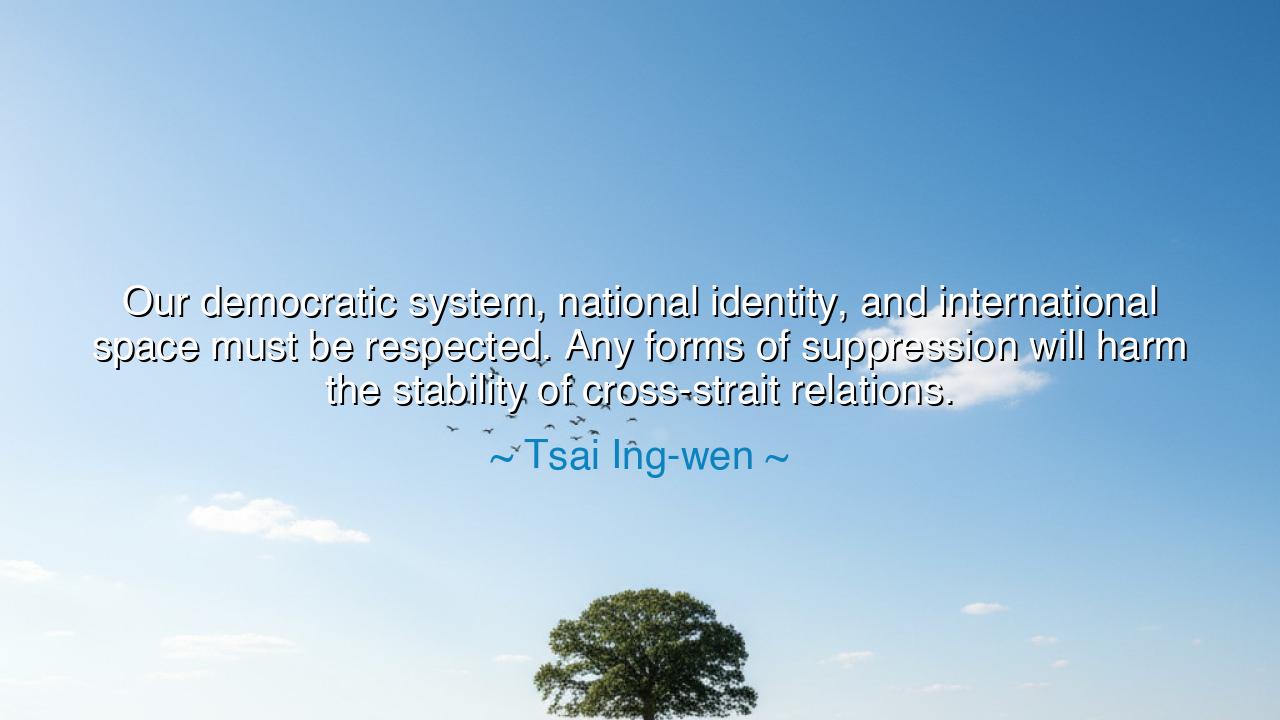
Our democratic system, national identity, and international space
Our democratic system, national identity, and international space must be respected. Any forms of suppression will harm the stability of cross-strait relations.






Hear, O seekers of wisdom, the solemn words of Tsai Ing-wen: “Our democratic system, national identity, and international space must be respected. Any forms of suppression will harm the stability of cross-strait relations.” This utterance is not the idle speech of a ruler, but the cry of a guardian who stands upon the threshold of history, defending the dignity of her people against the encroaching shadow of oppression. Within these words dwell ancient truths: that freedom is fragile, that identity is sacred, and that peace cannot be built upon chains.
The ancients would hear in her declaration the voice of a sentinel standing atop the city walls, proclaiming that the lifeblood of a people is not gold nor armies, but the spirit that binds them together—their system, their identity, their rightful place in the community of nations. For when these pillars are shaken by force or silenced by suppression, it is not only one land that trembles, but the balance of the world itself.
Consider the tale of the Athenians, who, in their devotion to democracy, defied empires far mightier than themselves. Against the encircling power of Sparta, against the looming shadow of Persia, they clung to their assembly, their voice, their freedom to choose their destiny. Though their city was once burned, their ideals endured, and their courage left a fire that still burns in the hearts of free peoples across ages. So too does Tsai’s call echo this legacy: the defense of a democratic system is not a fleeting struggle but a sacred duty.
Yet her words also warn: when suppression is used as a weapon, when dialogue is replaced by coercion, the harmony between neighbors shatters. We recall the lessons of the Cold War, when two mighty powers stood divided not only by borders but by systems of thought. Suspicion and suppression bred fear and conflict, and the world teetered on the edge of ruin. Only when channels of respect and recognition were sought did stability return. In the same way, cross-strait relations demand not domination but balance, not silencing but dialogue.
The national identity of a people is a flame. If left free, it shines with warmth, guiding the generations. If smothered, it smolders in anger and rises in rebellion. History offers countless proofs: the Poles under foreign partitions, the Indians under colonial rule, the Jews long exiled yet never forgetting who they were. Attempts at suppression only forged stronger resolve, until the day came when identity burst forth with renewed strength. Tsai’s words remind us that to honor identity is to preserve peace, while to deny it is to invite upheaval.
So too with international space: for no nation, great or small, can live in isolation. To be cut off, to be excluded, is to be denied dignity in the community of mankind. Yet when space is granted, when a people may breathe, share, and contribute, the world is enriched. The ISS, the United Nations, even the ancient Olympic Games—these are symbols that the many must stand together, respecting each voice, if peace is to endure.
For those who listen and seek wisdom for their own lives, the lesson is this: guard your identity with courage, honor the freedom of others, and resist the poison of suppression in any form. In the family, in the workplace, in the community, respect must reign if harmony is to live. Practical action follows: speak truth, even when it is difficult; give space to others to be heard; defend fairness when it is threatened. For these small acts echo the same eternal law that sustains nations.
Thus let Tsai’s words be remembered as a beacon for our age: “Our democratic system, national identity, and international space must be respected.” They are not merely the demands of one leader, but the song of all peoples who seek dignity. Let future generations say of us that we did not bow to suppression, but stood as keepers of freedom, as guardians of identity, and as builders of peace through respect.






AAdministratorAdministrator
Welcome, honored guests. Please leave a comment, we will respond soon